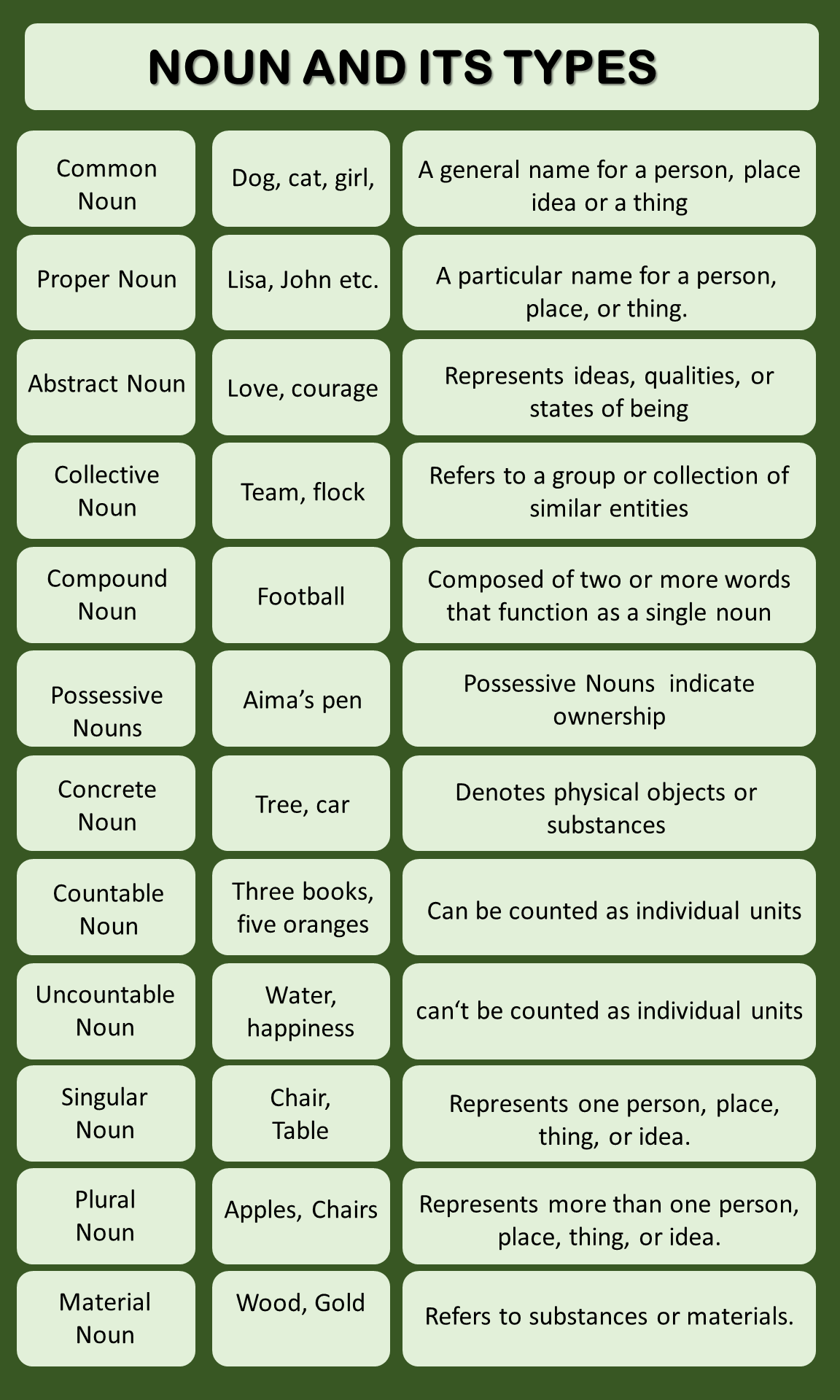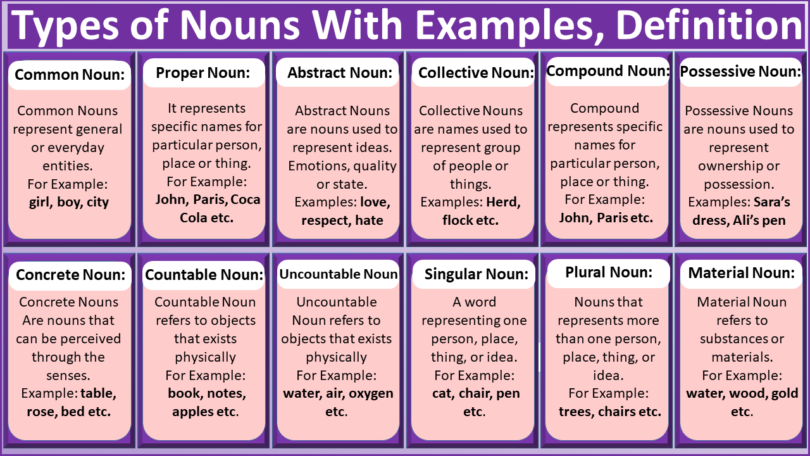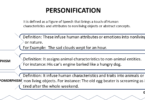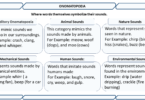A journey of exploration – Noun and its types, Learn Types of nouns with definitions and examples in a creative way.
Exploring Noun and its types, once in a magical kingdom, in the realm of Linguaria, there lived Grammar and Language playing a central role, and an inquirer noun named Ella. Ella wasn’t just a simple noun; she was a passage to a realm of different types of nouns, each having its special charisma.
Common Noun
Ella, the Common Noun, was pleasant, amiable, and ordinary. She referred to general things like “pencil,” “chair,” or “car.” You could find nice people like Ella anywhere. This tells us that common Nouns can be found everywhere in Linguaria, They are the backbone of everyday language.
Examples of Common Noun in Noun and its types:
City, River, Author, Corporation, Soda, Country, Book, Tower, Theme park, Mountain
Proper Noun
One day, the sun cast a golden glow over the tranquil town, painted the sky with hues of warmth. Whispers of anticipation danced in the air, waiting for something extraordinary to unfold. Ella met a Proper Noun named Peter. Proper Nouns are like the celebrities of Linguaria, making it beautiful with their unique identities. Proper nouns refer to specific and unique entities, such as “Mount Everest,” “Paris,” or “Mona Lisa.”
Examples of Proper Noun in Noun and Its types:
Paris, Microsoft, Eiffel Tower, Amazon River, Mount Everest, Coca-Cola, Harry Potter, Shakespeare, United States, Disneyland
Abstract Noun:
While they were exploring each other, they met Alvin, The Abstract Nouns. What does Alvin represent as an Abstract Noun? He said abstract nouns are intangible concepts, emotions, qualities or ideas that are not physical.Abstract nouns represent feelings, states of being, characteristics or general concepts that exist in the mind and are not concrete.
Abstract Nouns filled colours to the life of Linguaria. They express feelings and ideas and make language beautiful. They help to express how we feel and think in a cool way. It’s like adding magic to our words, making them more interesting and fun to use!
Examples of Abstract Noun in Noun and its types:
love, happiness, courage, freedom, justice and intelligence.
Compound Noun
They, together with the Aira, entered into the village of Compound Nouns and befriended Harvey. Harvey, representing Compound Nouns, told them that Compound Nouns are formed by combining two or more words, such as “basketball,” “toothpaste,” or “sunflower.” Harvey loves the idea to join words to create something new.
Example of Compound Noun in Noun and its types:
Sunflower, Airplane, Rainbow, Toothpaste, Basketball, Butterfly, Teaspoon, Bookshelf, Lighthouse, Bedroom
Possessive Noun
Continuing the adventure through the Grammar Mountains, they encountered Possessive Nouns like Harry. Possessive Nouns indicate ownership, such as “Henry’s car” or “the cat’s tail.” Harry is a social and very talkative person who always talks about who or what belonged to whom.
Examples of Possessive Noun in Noun and its types:
James’s coat, The children’s toys, The car’s engine, The students’ project, The men’s shoes etc
Concrete Noun:
Their linguistic adventure expanded into the world of Concrete Nouns, where they met Marrie. Concrete Nouns referred to physical objects, like “chair,” “pen,” or “cloud.” Marrie loves the tangibility of the things she represents.
Example of Concrete Noun in Nouns and its types:
Table, Chair, Desk, Pen, Pizza, Cake, Donuts, House, School, Bridge etc.
Collective Noun
As Ella and Peter, together continued their journey, they met Clara, The Collective Nouns. Clara represents groups of people or things, like “family,” “flock,” or “team.” Collective Nouns play their role to make Linguaria even more beautiful by adding a sense of unity to the language landscape.
Examples of Collective Noun in Noun and its types:
Team, Flock, Herd, School, Crowd, Pack, Army, Crew, Family etc.
Countable Noun:
They all continued their journey together, where Ella being the most friendly, lively and vibrant girl, was very happy with all her new friends. Advancing down the way, they met up with Countable Nouns like Alex. Countable nouns are counted as individual entities. They have both singular and plural forms.
Example of Countable Noun in Noun and its types:
Examples of countable nouns include “pen” (one pen, threepens), “cat” (one cat, two cats), and “orange” (one orange, five oranges). In contrast, uncountable nouns, like “water” or “knowledge,” are unable to count. Alex told his new friends that he loves organizing things into countable groups.
Uncountable Noun
Next, they met a very beautiful and lovely person, Aira, who represents uncountable Nouns. These nouns can’t be easily counted or separated into individual units, such as “water,” “knowledge,” or “love.” Aira brought the concept of unmeasurable quality to the linguistic scenery.
Example of Uncountable Noun in Noun and its types:
Water, Knowledge, Furniture, Sugar, Love, Sand, Air, Advice, Information, Weather
Material Noun:
Last but not the least, Elens adds, “Material Noun made up of materials or substances. They denote tangible and physical substances.”
Example of Material Noun in Noun and its types:
The necklace is made of beautiful diamonds.
She added, nouns can classify on basis of numbers into singular and plural noun:
- Singular Noun: When you refer to one thing, person or place. For example: Chair, Table etc.
- Plural Noun: A group of people, things or places. For example: Tables, pens, shirts, girls, mountain etc.
In the end, Ella, Harry, Clara, Alvin, Alex, Nelly, Harvey, Paula, Peter, and Marrie and Elans realize that together, they form the rich tapestry of nouns in Linguaria. Each has its own importance in the beauty of the language landscape.
And so, the story of Ella and her friends turned into a joyous occasion in every aspect, showcasing the value words could add to the magical world of Linguaria. And they all continued their linguistic journey in the best way ever, exploring the vast horizons that language had to offer.
Okay! let’s have a look on what a noun is and what are its types?
What is a Noun?
A noun is a word that represents a person, place, thing, or idea.Nouns can function as the subject, object, or the object of a preposition. Examples of nouns include “Cat,” “Ireland,” “Paris,” and “Love.” Nouns are a vital part of language and identify various elements in both concrete and abstract contexts.
Types of Noun:
The following table elaborates types of nouns:
| Sr. no. | Type of Noun | Description | Examples |
| 1 | Common Noun | A general name for a person, place idea or a thing | Dog, Cat, Girl, City, Boy, Book |
| 2 | Proper Noun | A particular name for a person, place, or thing. | Lisa, John, Ireland etc. |
| 3 | Abstract Noun | A state that cannot be sensed with senses. | Love, Happiness, Hate etc. |
| 4 | Collective Noun | A noun that refers to a group or collection of people, animals, or things. | Flock, Team, Herd etc. |
| 5 | Compound Noun | A noun formed by combining two or more words. | Notebook, Raincoat, Basketball etc. |
| 6 | Possessive Noun | A noun that shows ownership | Saria‘s car, the cat’s tail |
| 7 | Concrete Noun | Any physical object that can be sensed. | Tree, chair car, rock |
| 8 | Countable Noun | A noun that can be counted as individual units. | Two apples, five bananas |
| 9 | Uncountable Noun | A noun that cannot be counted | Air, Water, Happiness etc. |
| 10 | Singular Noun | When you refer to one thing, person or place. | Chair, table |
| 11 | Plural Noun | A group of people, things or places | Chairs, Glasses, Balls |
| 12 | Material Noun | Refers to substances or materials | Gold. Wood |

Here are types of Nouns with Definition and Examples







